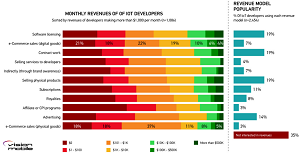News
Report: Developers Can Cash in on IoT E-commerce
- By David Ramel
- January 12, 2016
Developer research company VisionMobile Ltd. published a study indicating the confluence of the Internet of Things (IoT) and e-commerce provides a vast new source of untapped potential revenue for coders seeking to make money off their creations.
The moneymaking opportunity arises from the increasing growth of the IoT, on track to network billions of devices, sensors, systems, machines and just about every other type of "thing" one can imagine. When every thing is connected and comes with "smarts," new opportunities arise to make money from apps that include e-commerce capabilities, which VisionMobile said is a reliable, proven way to developer income.
"E-commerce is already the biggest revenue generator among mobile developers, yet only a small minority have acknowledged it and few have seized it with both hands," VisionMobile said in publicizing its recent "Commerce of Things 2015" report. "Mobile developers using e-commerce (for physical or digital goods) have median monthly revenues of $1,000-$2,000 compared to a measly $200-$350 median monthly revenue for mobile developers across all revenue models."
However, even in light of that information, only about 9 percent of developers work with e-commerce, VisionMobile said, referring to data from its 9th Developer Economics survey wave of May 2015.
That is set to improve, as the company envisions a future in which customer buying decisions are made impulsively and easily -- with no "friction" -- from within the context of what they're doing -- perhaps using an app -- instead of the traditional model of browsing lists of items.
 [Click on image for larger view.]
Low Revenue and Popularity: Still Early Days for IoT Developers Working with E-commerce (source: VisionMobile)
[Click on image for larger view.]
Low Revenue and Popularity: Still Early Days for IoT Developers Working with E-commerce (source: VisionMobile)
"Internet of Things and e-commerce have until now evolved in parallel," VisionMobile said. "They are now embarking on a common journey where every connected object becomes a potential e-commerce real estate." This, the company said, will disrupt e-commerce, extending e-commerce channels and affiliate schemes to any physical surface rather than just the traditional means such as Web sites, mobile devices and apps.
VisionMobile provides several examples to illustrate its premise.
"With IoT, washing machines can now not just deliver detergent just in time by knowing when your supplies run out, they can also recommend the right detergent, based on your usage or type of clothes, on demand," the company said. "Car makers can recommend where you buy your gas, by understanding your drive journey, availability of gas stations, pricing on-demand discounts, and gas station commission -- in fact Google’s Waze does this already. Watchmakers can command a commission from health insurers, as they can monitor your heart rate, temperature, fitness habits and determine what risk zone you are in. Moreover, makers of connected devices can now afford a negative BOM (bill of materials) 'à la Dell', by subsidizing the cost of hardware with the revenues from bundled e-commerce services."
The study was sponsored by Braintree, a PayPal company that facilitates app and online payments.
About the Author
David Ramel is an editor and writer at Converge 360.